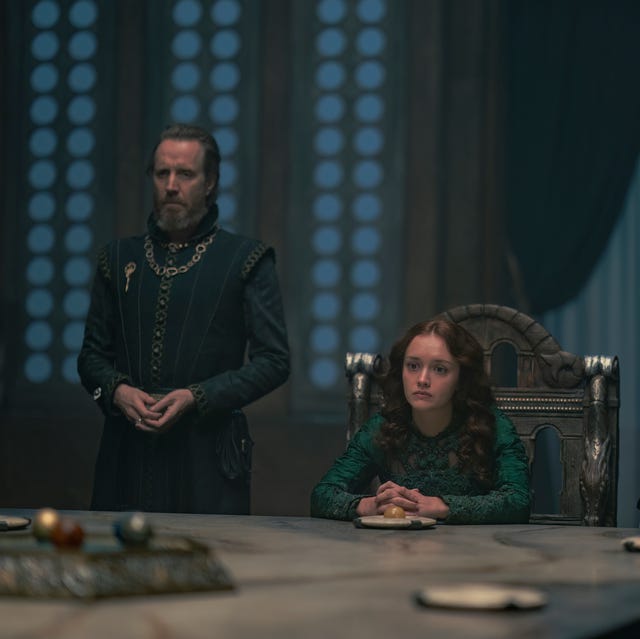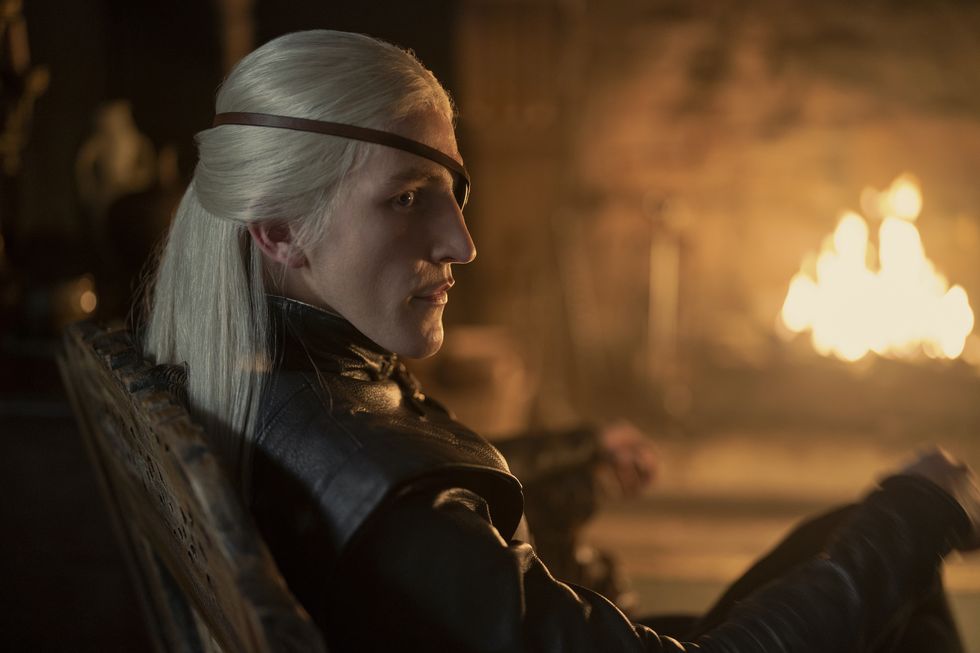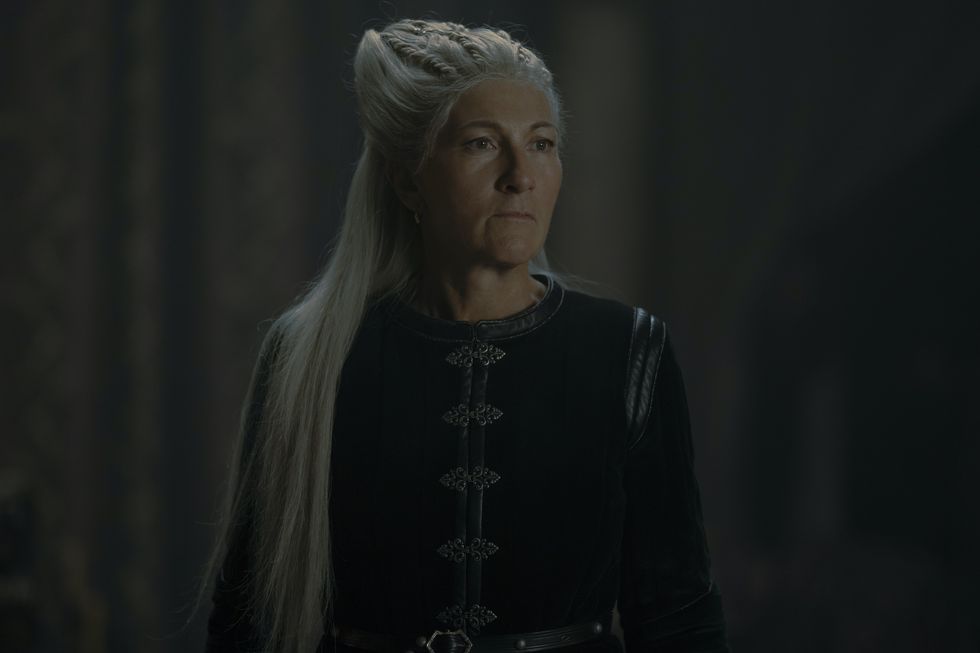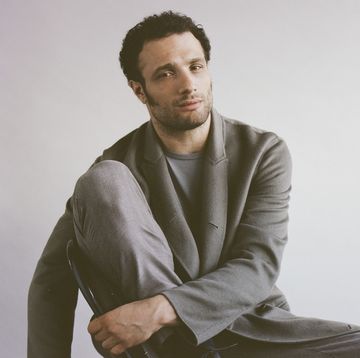The king is dead, long live the king. We just need to find him first. The penultimate entry into House of the Dragon’s first season, ‘The Green Council’, picks up right where last week’s episode left off. Viserys has indeed died, leaving a Paddy Considine-sized hole in House of the Dragon; his kindness and misplaced trust will be missed. But will it be a smooth transition of power? If it were, this would be a much shorter franchise.
Alicent (Olivia Cooke) tells her father about the late king’s deathbed mutterings – that he wanted Aegon on the Iron Throne – inevitably misinterpreting it along the way (wrong Aegon, alas!). Not that it matters: Otto (Rhys Ifans) and the rest of the small council have already been planning to do away with Rhaenyra and put Aegon, currently missing in action, on the throne. Alicent, after last episode’s détente with her former BFF, is understandably torn, leading to the question of the week: is Alicent Hightower a good person?
However frustrating the dream misinterpretation, it’s clear the showrunners want to build sympathy for Alicent, who veers constantly into cartoon villain territory. Surely we can’t blame her for crowning Aegon if that’s what Viserys wanted? It would be a more convincing narrative technique if it also didn’t make Alicent look so stupid. Even a mother’s love can’t blind her from the fact that Aegon is a simpering fool, who’s populating Flea Bottom with blonde bastards. Much of this episode is spent traversing brothels trying to find the young king, much to the chagrin of his younger brother, Aemond.
Alicent’s confrontation with Princess Rhaenys (Eve Best), easily the stand-out scene in this episode, really brings the Queen’s actions into focus. The two women, in their own sad ways, are the victims of other people’s plans. Alicent hopes to win the allegiance of the princess, who has been locked up unceremoniously overnight, selling her on a vision of a peaceful Hightower-led rule. Rhaenys is as impressed with the queen’s manipulation as she is appalled by her shamelessness; it’s a reckoning for both characters. Finally, Rhaenys helps Alicent see what she truly is: a prisoner. “You desire not to be free, but to make a window in the wall of your prison,” Rhaenys tells her. It’s a good line – delivering the kind of melodrama fantasy fans lap up – and the penny drops for Alicent.
So follows a series of revelations for the Alicent, which Cooke really sells (if this show has achieved anything, it’s shining a light on young British talent). First a showdown with Otto, in which she accuses her father of manipulation since she was a child. It’s a long time coming, and worth the wait for the added complexity. As Otto points out, Alicent is now a master manipulator and Queen of the Seven Kingdoms to boot. Otto, finally beaten, pulls a tried-and-tested cliché of frosty parental relations, telling Alicent that she’s never resembled her mother so closely.
And Alicent is not the only one processing some parental hang-ups. On the way to the coronation, she advises Aegon to rule fairly but the prince is caught up in his own drama. Viserys never liked him, he whines. It’s a very believable claim, though one we’ve seen little evidence of throughout this series. There’s a moment of uncertainty which gives way to disbelief for Alicent: how could a soon-to-be king be so hung up about his father? Our parents, it seems, really do fuck us up. It’s not the most profound theme, but it’s the one House of the Dragon has chosen to focus on. And with the show’s signature blend of campy drama and fantasy set pieces, it just about works.
Elsewhere, this episode spotlights some recurring problems. These small council meetings, one of the highlights of Game of Thrones, simply don’t work. The earlier, tenser affairs with Daemon (Matt Smith) and Rhaenyra (Emma D’Arcy) had some spark, but this episode’s meeting, which takes up far too much airtime, is a dreary, oxygen-less affair. There’s simply no one to care about; none of these characters are developed. When Criston Cole (Fabien Frankel) smashes Lord Lyman (Bill Patterson) against the table, it’s hard to feel anything beyond, ‘Oh, that was Fleabag’s dad’. And while it makes thematic sense to have Daemon and Rhaenyra out of the picture, unaware of what is going on – though, really, wouldn’t they have sensed that Viserys wasn’t long for this world? – the lack of Smith and D’Arcy zaps this episode of energy.
The biggest problem facing House of the Dragon, however, is continuity. Its time jumps have been smooth with regards to the cast (some of the child actors have been a touch baffling), but the show’s tendency to raise and drop plot points is increasingly troublesome. This week, in the middle of an ascension debacle, the show introduces an entire sub-plot about child violence. The White Worm, Daemon’s former mistress, knows where Aegon is and she’s willing to tell Otto. The price? Ban child fights (a past time Aegon enjoys watching) in Flea Bottom. It’s nice for the White Worm to be on the right side of history, but it’s hard to find it compelling, especially as no one was aware it was a problem until this episode.
Still, that ending is fairly undeniable. The sight of Rhaenys atop her dragon, Meleys, interrupting the coronation is exactly the type of memeable moment this show loves. Best portrays the Rhaenys as a hurt, resigned royal who, like a slumbering dragon, has just awoken in a thunderous mood. Her showdown with Cooke, who stands in front of her quivering son, is a satisfying conclusion for this pair (no blood is shed): mothers and manipulators squaring off. Sometimes it’s hard to take a show which relies on dragons for drama too seriously, but when the moment is earned, it’s a reliable dopamine hit. Next week: the finale, and hopefully Daemon’s take on child welfare.
Henry Wong is a senior culture writer at Esquire, working across digital and print. He covers film, television, books, and art for the magazine, and also writes profiles.















